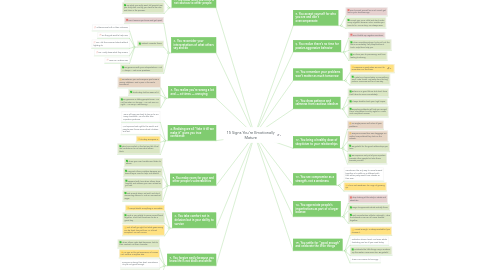15 Signs You’re Emotionally Mature
da Danny Forest

1. 1. You know what you think is not obvious to other people
1.1. Instead of blaming people for not magically getting you, speak your mind to the best of your ability.
1.2. Say what you really want, tell people how you really feel, and try your best to be calm and clear in the process.
2. 2. You reconsider your interpretations of what others say and do
2.1. Don't assume you know and get upset
2.2. Instead, consider these:
2.2.1. Is there some truth in their criticism?
2.2.2. Do they just want to help me?
2.2.3. Can I let this comment stand without fighting it?
2.2.4. Do I really know what they mean?
2.2.5. How can I make sure?
2.3. Be generous with your interpretations. And — always — ask more questions.
3. 3. You realize you’re wrong a lot and — at times — annoying
3.1. Sometimes, you and everyone you know is wrong, stubborn, and a pain in the ass to be around.
3.2. That’s okay, but be aware of it.
3.3. Be generous in letting people know. “I’m not fun when I’m hungry.” “I’m not sure I’m right.” “I’m sorry, I was wrong.”
4. 4. Realizing we all “fake it till we make it” gives you true confidence
4.1. We’re all trying our best to live up to our many characters. We all suffer from impostor syndrome.
4.2. We hope we look right to the world, and people won’t know we’re afraid, clueless, and lost.
4.3. It’s okay. Everyone is.
4.4. Take true comfort in this fact and let it fuel real confidence to not care what others think.
5. 5. You make room for your and other people’s vulnerabilities
5.1. Share your own troubles and listen to others'
5.2. See past other’s mistakes because you know they’re cries for help, not attacks.
5.3. Respond with love when others show fragility, and address your own as best as you can.
5.4. Get enough sleep, eat well, and don't discuss big issues in a rush or moments of anger.
6. 6. You take comfort not in delusion but in your ability to survive
6.1. Except death, everything is survivable.
6.2. Trust in your ability to piece yourself back together. Trust that tomorrow can be a good day.
6.3. Not all will go right, but what goes wrong can be fixed, learned from, or at least accepted. You will survive.
7. 7. You forgive easily because you know life is not black and white
7.1. When others make bad decisions, look to their context, not their character.
7.2. Are you out to get someone? Of course not. Neither is anyone else.
7.3. Everyone is doing their best. Sometimes, it’s just not good enough.
7.4. When that happens, show people compassion, and give them the benefit of the doubt.
8. 8. You accept yourself for who you are and don’t overcompensate
8.1. Don’t punish yourself so much. Don’t get lost in your shortcomings.
8.2. Accept your inner child and don’t make every regretful decision into a mistake you have to fix. You’re okay. You always were.
9. 9. You realize there’s no time for passive-aggressive behavior
9.1. Don't bottle up negative emotions.
9.2. When something stings, try to pull out the thorn immediately. Tell people where it hurts. Help them help you.
9.3. Go from pain to processing, and from feeling to sharing
10. 10. You remember your problems won’t matter as much tomorrow
10.1. Presence is great when we use it to remember our smallness.
10.2. Make tiny choices today. Fix something small. Take a walk. Get away from the big picture. Tomorrow will be a new day.
11. 11. You draw patience and calmness from cautious idealism
11.1. Believe in a good future, but don’t force that future to arrive immediately.
11.2. Always double-check your high hopes.
11.3. Expecting setbacks will help you accept them, stay patient, and try again in a calm and composed manner.
12. 12. You bring a healthy dose of skepticism to your relationships
12.1. No single person will solve all your problems.
12.2. Everyone carries their own baggage, no matter how polished they look on the outside.
12.3. Be grateful for the good relationships you have
12.4. Be suspicious not just of your impulses towards other people but also those towards yourself.
13. 13. You see compromise as a strength, not a weakness
13.1. Sometimes, the only way to move forward together is to settle on a different path than either party would have chosen on their own.
13.2. This is not weakness. It’s a sign of growing up.
14. 14. You appreciate people’s imperfections as part of a larger balance
14.1. Stop looking at life solely in ideals and absolutes
14.2. Begin to appreciate what’s actually there.
14.3. Each imperfection reflects a strength. Value the balance so we can all move forward together.
15. 15. You settle for “good enough” and celebrate the little things
15.1. “Good enough” is always available if you choose it.
15.2. Perfection doesn’t exist, and even what’s frustrating can be all you need today.
15.3. Celebrate the little things. Buy a Snickers. Tip the waiter. Have some tea. Be grateful
15.4. There is no reason to be angry.


